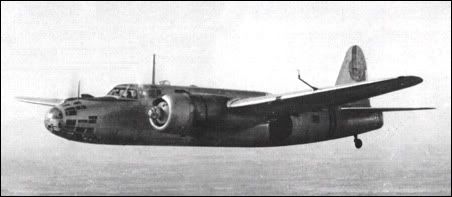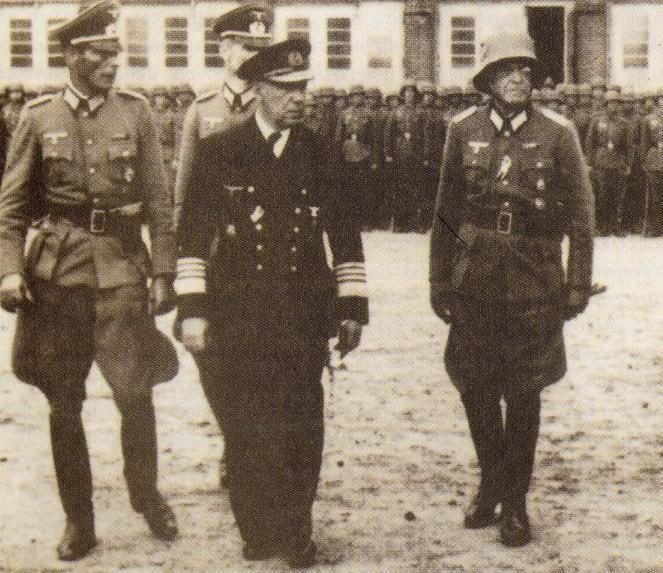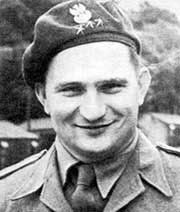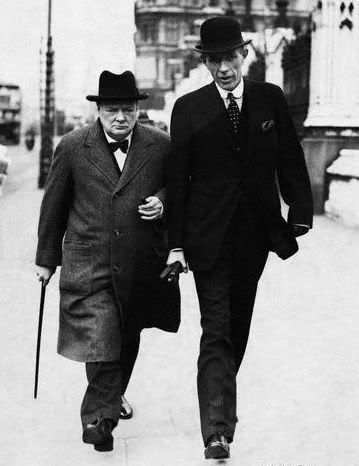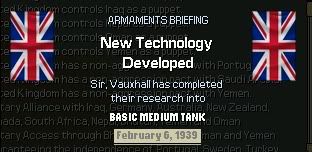Chapter twenty-four: Behind the Iron Wall
Berlin had been impressed by the speed and vigour the Poles had resisted the Communist subjugation. As early as May 1935 the Abwehr began to look towards how Germany could help the local populations who were now actively resisting Soviet occupation. Of course the traditional military circles were against this move and Stresseman hesitated about it, so the project was stalled for some time until Wilhelm III asked directly what was being doing to help the Poles and raged when knew the truth. Thus the II Department of the Abwehr created a 'Special Operations Group' which was completely devoted to covert actions in Poland.
For this mission a new unit was created, the Bataillon Ebbinghaus, within the Branderburger Regiment. It was formed mostly from Volksdeutsche who were fluent in Polish. It was commanded by Hauptmann (Captain) Theodor von Hippel, who had served under General Paul von Lettow-Vorbeck during the First World War in the East African theatre.
Wilhelm Canaris (center) & Theodor von Hippel (right, with the helmet), inspect a Brandenburger unit.
The unit began by doing clandestine field research in the Baltic and Poland, gathering gathered vital economic, military and geographic information to support the AK. As there was no need to instigate Polish resistance and the usual ill-will between the two nations had vanished in front of the dramatic situation, the cooperation between the Ebbinghaus and the AK started without too much ado.
The Ebbinghaus Bataillon assisted the AK with trainning facilities in Baviera and logistical support. By May 1936 the Polish government in London allowed the creation of a elite special operation unit that was to operate from Germany: the
Cichociemni ("
the Silent-Dark Ones" or "
the Unseen and Silent"), commanded by Captain Jan Górski. By April 1937 this unit was ready to begin covert operations in Poland, air delivery of arms and supplies, and training of agents and by September the unit began his land deliveries of weapons, money and supplies. Some
Cichociemni special units were parachuted over Poland and joined the AK (1).
The first drops of aid and men were made in February 1938 from Heinkel He 111 bombers (and later on, from two prototypes of the Junker Ju 89 heavy bomber, the V2 and V5). Adolf Pilch, a young Silesian member of the
Cichociemni, was dropped into Poland in April 1938. He contacted numerous small bands of the AK and brought them together as a more effective force relying on German and some stolen Soviet weapons. He even organized a cavalry partisan unit in the Nowogródek area, and broke through to the Kampinos forest near Warsaw, taking control of this area. At its height of operations his unit consisted of up to 1000 men. Until Poland was liberated, Pilch became a thorn on the side of the NKVD.
Major Adolf Pilch "Dolina" (1914 - 2000)
When Edward Frederick Lindley Wood, Viscount Halifax, landed in Rome on April 28th, 1938, to improve British relations with Italy and to ensure the current status quo of Europe, he hardly could imagine that he was to witness a small purge within the Fascist ranks. Evertyhing looked calm and peaceful in Rome and nothing could foretell what was to come. During a meeting with Italo Balbo, Lord Halifax noticed that Italo Balbo looked as if his mind was not in the room. Thus, Halifax was beginning to wonder what was going on when he suggested, in very vague terms, to Balbo that the United Kingdom may be interested to sign a Non-Aggression Pact with Italy and Balbo just nodded and muttered that the Lazio was playing awfully that season. Puzzled and perplexed, Lord Halifax was reduce to silence for a moments. Then, when he was opening his mouth, the bomb exploded.
A Black-shirted aid de camp approached Balbo and muttered some words in his boss' ear. Balbo just jumped from the chair and, with a big grin on his face, exclaimed: "
Gotcha!". Then, apparently, he remembered his meeting with Halifax and, offering some silly excuse, he hurried out of the room leaving the baffled Englishman wondering what the hell was going on.
Here we can see Winston Churchill and Lord Halifax having a chat before both departed to their overseas missions. Readers shouldn't be mislead by Winston's not-to-happy face.
After some weeks of bickering between Balbo and one of his most hatred rivals, Roberto Farinacci, the issue had come to a head. It had all begun with a report by General Mario Roatta that shown the poor state of the Italian army, despite Balbo's reforms. It still lacked modern equipment and its units were understrenght, not sufficiently mechanized or even motorized, and reliant on old guns. In spite of the purchase of some hundred tanks to France, the lack of modern and sufficient armor and anti-tank weaponry was acute.
All this was attacked by Farinacci in the press. He began by acussing Balbo of being obsessed with "reckless diplomacy and political maneuvering" and lambested his political rival for letting such a situation to happen. As Balbo remained uncannily and notably quiet, Farinacci grew bolder and included Dino Grandi in his attacks. Grandi wasted no time in replying and the newspapers soon became the battlefield between the two. Grandi managed to achieve what Balbo's silence hadn't, that is, that Farinacci lost his temper. When Grandi rebutted angrily and attacked Farinacci for his lack of experience, provincialism, and flagrant admiration for some extremist theories (2), Farinacci overstretched his hand: in a quite remarkable article, the Fascist leader pontificated about the necessity for unity and order, the necessity for a new leader and man of vision (he, it goes without saying), and the failure of "old aristocratic and bourgeois institutions" to handle the new age. Farinacci blamed the factory-holding elites, the banks, and the land-holders and the "Jewish" influences and "the old elites". He attackedd the "whole antiquated Savoian system" and even dared to suggest that Italy would be better without a King.
It was his end. It is still unkown how Farinacci's advisors didn't stop the article from being published but, when they reacted, it was already to late. Balbo, who had been so uncharacteristically silent before, now rose to the moment. He assembled the Fascist Grand Council for an extraordinary meeting and there he read off the list of "wrong doings" that signalled the end of Farinacci's political career. He acussed Farinacci of questionable loyalty to the crown and nation, his "crippling devotion" to "dangerous extremism" and his corruption. As a final measure he presented the council with evidence of Farinacci's personal financial holdings, that had increased notably since the death of Mussolinni.
While there was no hard evidence linking Farinacci to any wrongdoing, the circumstantial evidence was enough to bury him. In spite of Farinacci's protests of innocence, he was forced to resign from the Grand Council and the king accepted it even before he wrote it. During the following weeks, the Italian Fascist Party was purged from his ultra-right elements.
When Lord Halifax returned to London, empty-handed, he had a good story to tell.
(1) When Poland was finally freed, the Cichociemni had delivered 630 tonnes of war material, mainly by a air bridges, losing 30 planes to air crashes and enemy fire. In addition, 180 soldiers and 10 envoys successfully parachuted into Poland. 42 of them would in fights against the Communist forces, 5 were executed during and after the war and 4 died when their planes were shot down.
(2) One could argue that, at this point, Farinacci was turning into Italy's Gregor Strassser.
@trekaddict -1-: Well, France will feature in the future and will "help" Churchill in their proverbial way to do the mental change.
Like that? :laugh:
@Sumeragi: Darn. But for the last footnote at Winston's pic, I tried to be bloody serious.
@Nathan Madien: A sadly deceased AAR that I still miss. Thank you for honoring me comparing this poor writting with that AAR.
@trekaddict -2- Let's try not to spoil anything: let's simply say that the one "disgraced" will fare much better than the "winner". Very much. Just be patient. Think of King Arthur!
